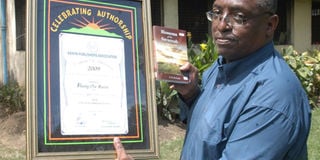Henry ole Kulet: Proud defender of our African identity

Mr Henry Ole Kulet with the trophy, certificate and the book which won him the Jomo Kenyatta Prize for Literature and a nomination for the Dublin Literary Award in 2009.
What you need to know:
- My first encounter with ole Kulet was at the Kenya National Library in Nakuru.
- It was a great chance to ask a few questions regarding his books.
- He spoke with unmatched exuberance and rare persuasion.
Dr Henry ole Kulet, the author of Is It Possible? rested on February 16, 2021 at 75, but his wonderful words live on.
My first encounter, and now the last, with ole Kulet was at the Kenya National Library in Nakuru, on April 2019. I had just concluded my teaching practice at Uhuru High School and decided to take a week to carry out some research and write, particularly on the subject of socio-economic disparities among town dwellers. It was a topic inspired by my interaction with my students, most of who came from the slum areas in Nakuru County, and some- quite a few- from rich Njoro neighbourhoods. The library proved to be a considerably serene and convenient space to work from, given that there were easily accessible resources.
On the day I met ole Kulet, I was in the America Bazaar space, in the third floor, sitting at a corner next to a hyperspacial, end-to-end glassed window that allowed me to gracefully view the lush vegetation below. I was distracted from my study by an endless scurrying and foot stamping that went on for close to two minutes. Reluctantly, I decided to turn around to see what was happening. Besides, is it not advisable to be aware of your milieus? I also expected absolute quiet in a library, and for that reason, I stood up and walked stealthily to an open room where people were flocking. It was the high school students who had come to meet ole Kulet, moving in excitedly.
I love my vernacular language and I want it to be read world over.
Impressively, and in a dilemma-filled air, the librarian announced that the author of one of the set books the students were reading in school would be coming in shortly. I thought, “Who else?” A few minutes later, a tall man of upright stature walked in delightfully, holding the hand of a young girl- who was later introduced as the granddaughter- walked into the room. I decided to dash out, close my books and pack my computer to join the crowd. It was a great chance to ask a few questions regarding his books, some of which I had taught a few days earlier, and tested my students on. It was the perfect time to hear from the horse’s mouth.
Decades of writing
In brief, he spoke with unmatched exuberance and rare persuasion for the first twenty minutes; taking his audience through his biography and his decades of writing. Interestingly, I loved it when he singled out, Is It Possible? to demonstrate his transformation as a person and as a writer,. It was the first novel written by him that I had read, back in 2012 while in Form Two. Since that time, I hoped to be fortunate enough to meet the author. Unbelievable as it was, I was only sitting two steps away from him.
I had many questions for him. When I pointed out that some literary critics had expressed discomfort with his extravagant use of Maasai expressions in his writing, he responded with a few words: “It is the hate that we have wielded against our local languages that makes us question why we use them in our writing. I love my vernacular language and I want it to be read world over. But you can always find translations in the glossary.”
Rest well, literary doyen, and proud defender of our African identity.





